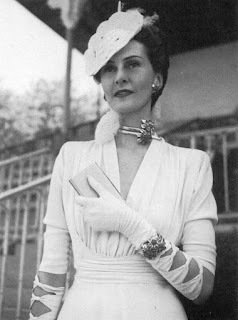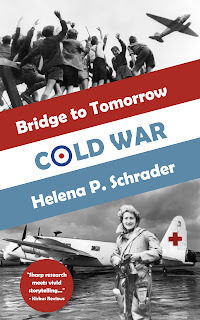Secondary Characters of "Cold War" - Virginia Cox-Gordon
The post-war period is rightly remembered as a nadir in women's rights. When "the boys came home," many women who had been doing 'mens' jobs' were dismissed and told it was time to become 'wives and mothers.' Most women were probably glad to see the last of an ordinance factory, but others were frustrated to be thrown out of responsible and challenging work. As always, there were also women who defied the trend and found ways to remain active professionally. Virginia Cox-Gordon is such a woman.

Virginia is one of those women who has found herself during the war. The daughter of a millionaire, she was the "catch of the season" when she made her debut just before the outbreak of the war. Beautiful, rich and spoiled, she enjoyed being 'daring' and dating not-so-suitable men such as the aerobatics pilot Robin Priestman. Yet fundamentally, she was bored to death with life -- until the war broke out. The war opened up opportunities that she had never dreamed of and also fed her insatiable curiosity with real news rather than gossip. She became a journalist for The Times.
Yet while opportunities of women journalists opened up during the war, the profession remained male-dominated. Competition for the best stories and first report was cut-throat. Virginia had to play the game by the brutal rules -- or get left by the wayside. By the end of the war, she has established herself as a first-rate reporter, but the prejudice against her sex is worse than before. She uses the weapons she has -- beauty, sex-appeal and a powerful and wealthy father -- to hold her own. But her struggle has warped her and she has paid a heavy price in personal happiness for her success.
An excerpt with Virginia:
“Mrs Hart, please try to understand.” VirginiaCox argued patiently with the WAAF officer. “Everyone is talking about theseparachutes with sweets attached. There were scores and scores of witnesses, butno one has a photo of it. A picture is worth a thousand words. All I’m asking is that you lend me youradorable little daughter for a few hours. With her bright blond hair, she looksGerman. We can braid it the way the Germans do and dress her in the oldest,most faded clothes she has. I’ve already made a parachute with one of my oldscarves and have attached some Hersey’s chocolate that an American friend gaveme to it.” Virginia held up her contraption. “We can throw the parachute out ofan apartment building window and position Hope below, waiting with upliftedarms. It will be a sensational shot!”
“It would be fake,” Kathleen answered tartlyand indignantly. She did not like this idea at all.
“No more ‘fake’ than most of the films andphotos we made during the war,” Virginia countered. “You know as well as I do thatall those laughing ‘Fighter Boys’ lounging around waiting for a scramble wereposed for the photographers. And so were the images of Bomber Boys intentlywaiting to hear the ‘target for tonight.’ But they weren’t lies. They werestaged, yes, but they replicated reality as accurately as possible. Thatis what I propose to do now. What is so wrong with that?”
Kathleen didn’t have an answer. She lookedover at Hope, who at once started begging. “Please, Mummy! Please!” Kathleenhated being manipulated and all her instincts said this was wrong, but shelacked the arguments to plead her case.
Yes, she could slam the door in the reporter’sface, but that would probably land her in more trouble. The reporter worked forthe Times, and her father sat in Parliament. Perhaps more relevant, the WAAFOC was on very good terms with her and had brought her over, saying she was“sure” Assistant Section Leader Hart would have no objections. She took a deep breath. “I’m sorry, but I’mnot going to let you just borrow Hope. If you want to take Hope anywhere, thenI am coming with you. It is my day off.”
“Oh, splendid!” Virginia agreed withexaggerated enthusiasm.
An hour later, Kathleen and Virginia weresitting in the back of a confiscated “Kuebelwagon” with British occupationlicence plates while Virginia’s photographer drove them along the edge of theHavel on their way to Tempelhof. Hope was sitting in the front seat beside thephotographer. She was happy as a lark in the open vehicle with the wind blowingher hair. Where Virginia got the petrol rations for this outing, Kathleen couldnot fathom, but apparently the press had privileges and it was not her place toquestion them.
Virginia had Kathleen trapped as she turned toask, “Why is it, Mrs Hart, that I get the feeling you disapprove of me? We’reboth career women, after all. We ought to be allies! We should join forcesagainst a world that would like to shoo us both back behind the stove.”Although she tried to make the question sound light-hearted, Kathleen knew shewas deadly serious.
“What I don’t like,” Kathleen answered,meeting the reporter’s eyes, “is that you are turning Hope’s head, making herfeel special and glamorous. It’s quite misleading. She’s just an ordinary seven-year-old.”
“Is she?” Virginia asked with a raisedeyebrow. “I think Hope is an adorable and photogenic child. She’s sure to growinto an attractive girl. Every beautiful woman should learn to use her charmsto get what she wants as early as possible.”
That was not the way Kathleen had been raised.Then again, she hadn’t been happy in the world her parents had made for her. Wouldshe have been happier following Miss Cox’s advice? She didn’t think so. It wastoo mercenary, too exploitative, and didn’t leave room for giving as well astaking. Out loud, she reminded Virginia, “Beauty is ephemeral. It can beshattered in a single accident or fade over time. Either way, it is better fora woman not to depend on it too heavily.”
“Beauty is the most powerful weapon women haveand ought to be used mercilessly as long as one has it,” Virginia countered. “Whichdoesn’t mean one can’t develop other skills. I think it’s marvellous thatyou’re an air traffic controller. I was serious about wanting to interview you.I’m sorry you didn’t get in touch with me after our last meeting.”
“I am very busy.”
“I’m sure you are, but we have lots of timeuntil we get to Tempelhof. Why don’t you start by telling me how you landedhere? Weren’t you worried about bringing a child into what is practically awarzone?”
“When I volunteered for Gatow, it was a sleepy,forgotten backwater, and I wanted to be near my husband.”
“Your husband?” Virginia gasped, glanced atKathleen’s hand. Only now did she notice her wedding ring. “Silly of me! Iassumed you were single. What’s his role?”
“Navigator on a Lancaster. He’s in theCommonwealth War Cemetery.”
“Oh! You mean he’s dead! Well, thatdoesn’t count then, does it?”
“To me it does,” Kathleen retorted, thinking howthe longer she was here, the more often he seemed to visit. Mostly he came inher dreams, but sometimes she sensed his presence when walked beside theperimeter fence to get fresh air, or when she sat alone in her flat after Hopehad gone to bed.
Virginia had been talking and when Kathleendidn’t respond, she repeated her question, “Do you feel you are treated thesame as to your male colleagues?”
“Most of the time,” Kathleen answered, appendingher answer with, “it depends on the CO.” Soon, without realising what washappening, Virginia had drawn Kathleen into a conversation so successfully thatKathleen was surprised when they reached Tempelhof. American Skymasters wereswooping down at them, and the roar of their engines was deafening. Their wheelsand flaps were down as they passed directly overhead, and one could see the oilstains on the wings and the bolts holding the fuselage together.
“Oh, look!” Virginia exclaimed. “There’s agroup of German children over there. They must be hoping for a sweet drop!Let’s go and talk to them.” Flinging the car door open, she made a beeline for Germanboys and girls, Hope and Kathleen forgotten. Kathleen took a disgruntled Hopeby the hand and followed.
Virginia emerges as a more important character only in "Cold War."
Berlin is under siege. More than twomillion civilians must be supplied by air -- or surrender to Stalin's oppression.
USAF Captain J.B. Baronowsky and RAF FlightLieutenant Kit Moran once risked their lives to drop high explosives on Berlin.They are about to deliver milk, flour and children’s shoes instead. Meanwhile,two women pilots are flying an air ambulance that carries malnourished andabandoned children to freedom in the West. Until General Winter deploys on theside of Russia. Buy now!
Based on historical events, award-winning and best-selling novelistHelena P. Schrader delivers an insightful, exciting and moving tale about howformer enemies became friends in the face of Russian aggression — and how closethe Berlin Airlift came to failing.
Winning a war with milk, coal and candy!




